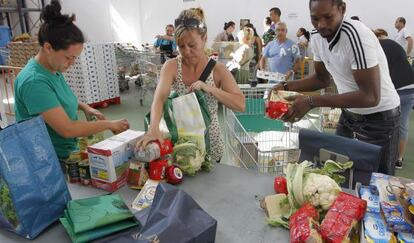Feeling lonely? You’re not alone
Report finds that loneliness is on the rise in Spanish society, partly due to unemployment


She spends entire mornings swimming by herself at the municipal pool in the working-class neighborhood of Carabanchel (Madrid), because entrance is just €1.50. On other days, she goes to the public library to sit down at a computer and check her Facebook account.
On sunny days he cares for the plants on his balcony and carefully prepares delicious meals for one inside his kitchen. Sometimes he realizes that he hasn’t been outside the house for days.
She never got married or had children, her parents passed away, and she gradually lost all contact with her siblings.
He is divorced, has no children, and his relatives live 10,000 km away in his native Argentina, which he left 21 years ago.
My loneliness is not just physical, it is also cultural, intellectual and professional”
Gustavo Ferrarese
Conchi Rico and Gustavo Ferrarese both happen to be 53 years old. But there are many things that divide them.
She is a nursing assistant who never held a steady job and went “truly hungry” before being accepted at a soup kitchen.
He is a former executive for a ceramics multinational who used to be very well off; a music buff, he was a member of the Valencia Philharmonic Association, and held a season pass to the Palau concert hall.
But these days, both of them live alone – and feel alone.
Loneliness came to them through unemployment. As they soon found out, joblessness gradually drives your friends away: people call less and less often because what’s the point, if you’re going to reject their invitation for lack of money? When you can’t afford to go out for a cup of coffee, you start losing your relations.
Conchi has been out of a job since August of last year and is collecting a monthly check of €375 “with no extra pay.” Gustavo has been unemployed for the last six years and has used up his last subsidy. Now he is waiting for a year to elapse before he becomes newly eligible for a monthly stipend of €426.
“Loneliness really weighs down on you, it’s like the walls are closing in on you,” says Conchi, who doesn’t know whether she’ll have someone to celebrate her birthday with this coming December.
“You feel lonely when you fix a very nice meal and then eat it all by yourself. Or when the jasmine is in bloom on the balcony and none of your friends have come to see it in two weeks,” says Gustavo.
“Loneliness creates a loop, because the individual lacks enough drive to go out and seek a relationship”
Rocío Fernández Ballesteros, chair emeritus of psychology
Both are part of a new category of “victim” of solitude: the unemployed.
“Unemployment entails a loss of money, prestige and power. It can make you socially isolated,” explains Juan Díez Nicolás, winner of the National Sociology Award.
Nicolás headed a research project, La soledad en España (Loneliness in Spain), whose results were published last week. According to this study, four million Spaniards feel lonely.
The report, based on expert interviews and 1,206 surveys, shows that 20 percent of Spaniards live by themselves. But of these, the vast majority (nearly 60 percent) say it is out of personal choice.

Only eight percent of Spaniards aged 18 and over “can be considered to be truly isolated, meaning that they live alone out of obligation, not personal desire,” reads the report.
“The job situation is the variable that contributes the most to sociability. People with full-time jobs have greater sociability than those who do not,” the study adds.
Over half the population has experienced loneliness in the last year, and nearly one of every 10 people feel lonely very frequently. Díez Nicolás says that loneliness is a growing problem in Spanish society, partly due to new social habits. “Life in the big city, more disposable relationships... You live for the moment.”
Rocío Fernández Ballesteros, emeritus chair of psychology at Complutense University in Madrid, says that “the main sources of social relations are basically family, the neighborhood, school, university and the workplace. If work is missing, an important source is missing.”
Unemployment entails a loss of money, prestige and power. It can make you socially isolated”
Juan Díez Nicolás, National Sociology Award winner
This scholar notes that the feeling of loneliness “creates a loop, because the individual lacks enough drive to go out and seek a relationship.”
Ultimately, loneliness can derive into depression, although “not all feelings of loneliness do.” Fernández Ballesteros underscores that being alone can be positive for personal development and stocktaking. In fact, this feeling “can be considered normal in the life of an individual; the main thing is how frequently it occurs.”
For Conchi and Gustavo, the answer is very frequently.
“You feel like you’re always the odd one out, and since you have no money, if you join the party it also makes you look like a freeloader,” says Conchi. “I’m better now, but at one point I was hospitalized due to stress.”
“My loneliness is not just physical, it is also cultural, intellectual and professional,” explains Gustavo, who stopped going to concerts and museums because he can no longer afford to. “I’m all right today, but there are days when I can’t see the light at the end of the tunnel.
English version by Susana Urra.
Tu suscripción se está usando en otro dispositivo
¿Quieres añadir otro usuario a tu suscripción?
Si continúas leyendo en este dispositivo, no se podrá leer en el otro.
FlechaTu suscripción se está usando en otro dispositivo y solo puedes acceder a EL PAÍS desde un dispositivo a la vez.
Si quieres compartir tu cuenta, cambia tu suscripción a la modalidad Premium, así podrás añadir otro usuario. Cada uno accederá con su propia cuenta de email, lo que os permitirá personalizar vuestra experiencia en EL PAÍS.
¿Tienes una suscripción de empresa? Accede aquí para contratar más cuentas.
En el caso de no saber quién está usando tu cuenta, te recomendamos cambiar tu contraseña aquí.
Si decides continuar compartiendo tu cuenta, este mensaje se mostrará en tu dispositivo y en el de la otra persona que está usando tu cuenta de forma indefinida, afectando a tu experiencia de lectura. Puedes consultar aquí los términos y condiciones de la suscripción digital.








































